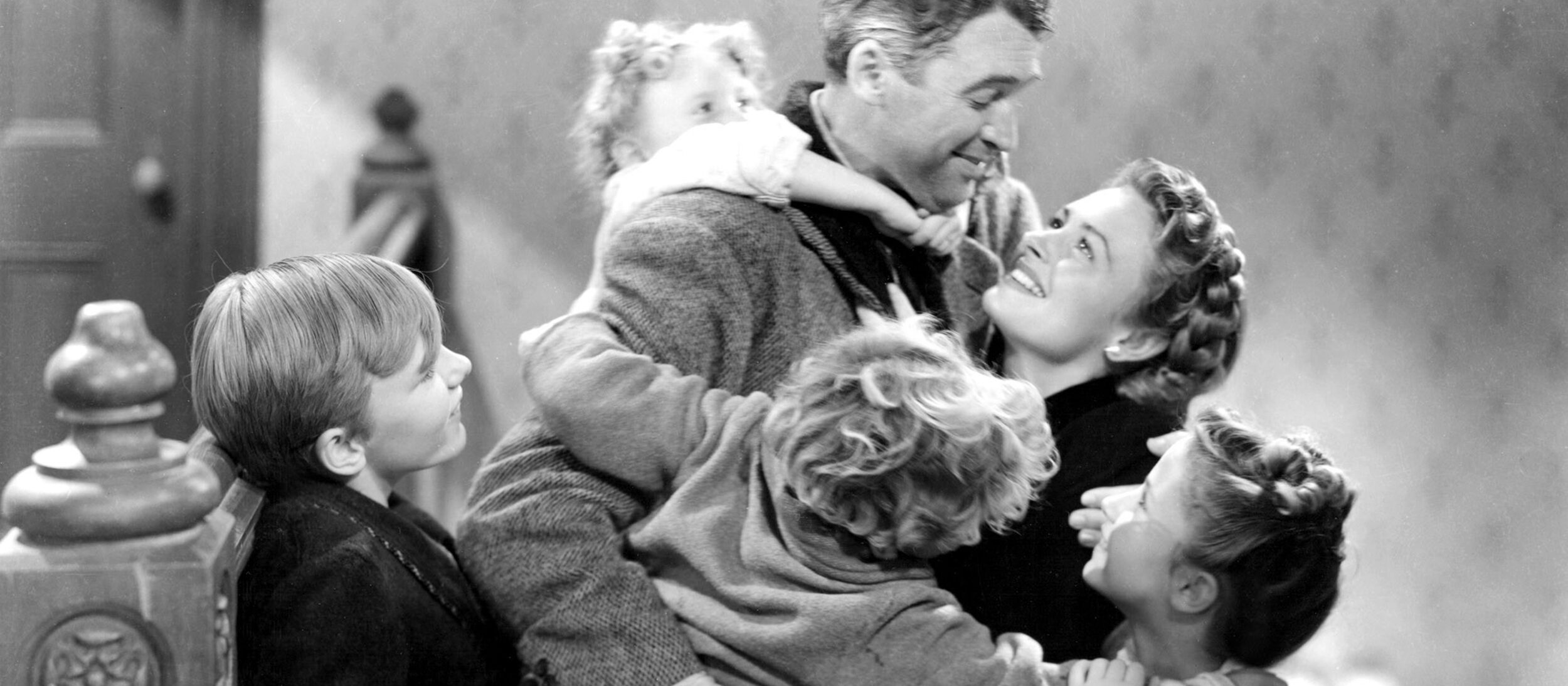

“Strange, isn’t it? Each man’s life touches so many other lives.”
Over the past few years, and despite my best efforts to make Bob Clark’s Black Christmas the winner, Frank Capra’s It’s A Wonderful Life has, through natural means, established itself as my family’s annual holiday tradition. I suppose it’s a little more family-friendly than a slasher film. Anyway, this year we watched a colorized version produced by Legend Films—a vast improvement over previous attempts to update the black-and-white classic for modern audiences, but still no reason to forsake the original version.
Though its elliptical story of George Bailey’s (James Stewart) life, harrowing crisis, and life-affirming epiphany does tend to feel contrived—especially after seeing it for the umpteenth time—its timeless themes and emotive conclusion never fail to tug at the old heartstrings in a way that feels quite fair. It’s also, in part, a superior romantic comedy with considerable depth to it.
In each vignette presented to the wingless angel Clarence (Henry Travers), who has been called upon to intervene in George’s predicament, George is presented with a choice that will shape the rest of his life. He chooses selflessly in every case, ultimately giving up his grandiose dreams of traveling and architecting in order to serve his family and community. All of these choices seem to come back to haunt him all at once when his uncle and business partner (Thomas Mitchell) accidentally hands over a small fortune to their nemesis, ruthless magnate Mr. Potter (Lionel Barrymore), who suggests to George when he comes begging for a loan that George might be worth more dead than alive. But of course nothing could be further from the truth.
During the film’s insightful climax, Clarence shows George a vision of what his world would be like without him in it. It’s not a world with a fundamental flaw different from our own, but a fallen one, just like ours, in which good men have done nothing to prevent the propagation of evil. George’s brother Harry (Todd Karns) dies in childhood, never growing up to be a college football star and earn the Medal of Honor, because George isn’t there to save him from drowning. His old boss (H.B. Warner) goes to prison for inadvertently poisoning a child because George wasn’t there to catch his mistake. The housing development he’d overseen (though, according to the script, never made a dime from), which had been populated by proud home owners, never materializes. In fact, Bedford Falls is renamed after Mr. Potter and devolves into a sordid place full of sleazy entertainment and unfriendly people. Violet (Gloria Grahame)—the woman George might have romanced if he hadn’t settled down with Mary (Donna Reed)—becomes a prostitute, while Mary never finds her soulmate.
Realizing his foolishness, George prays for the vision to end, to be returned to his dire circumstances, which, in light of his epiphany, no longer seem so bad. Rushing back to his house, he’s reunited with Mary and their children, no longer caring about the looming presence of the bank examiner and police chief. But then: a Christmas miracle. After decades of showing selfless goodwill toward others, the community comes to George Bailey’s aid by donating enough funds to cover the Building & Loan’s shortcoming. For some reason, even though the breathless reunion with Mary and the kids and Uncle Billy’s upending of a basket of cash is the logical emotional crescendo, I always find myself struck by the late telegram from Sam (Frank Albertson), who sends word from Europe that his office has been authorized to advance money in excess of what George needs.
Regrettably, you’ll find dozens of articles written by hipster ideologues who have little to no understanding of morality, theology, economics, or storytelling, or how those things might be bundled into an entertaining and uplifting motion picture, which try to convince the reader that the film’s messaging is all backwards and its implications disturbing. They do comprehend desire, however, and the root of all their crying foul seems to be that the film suggests that selflessness wins out over selfishness in the final tally. That just doesn’t jibe with their narcissistic worldviews. No, George Bailey doesn’t lead the most blessed existence, and by the end of the film he is still in dire straits, but despite a lifetime of frustrations, sacrifices, temptations, resentments, and compromises, he has managed to live his life well. It’s almost as if a clear conscience and deep friendships do make life wonderful after all.